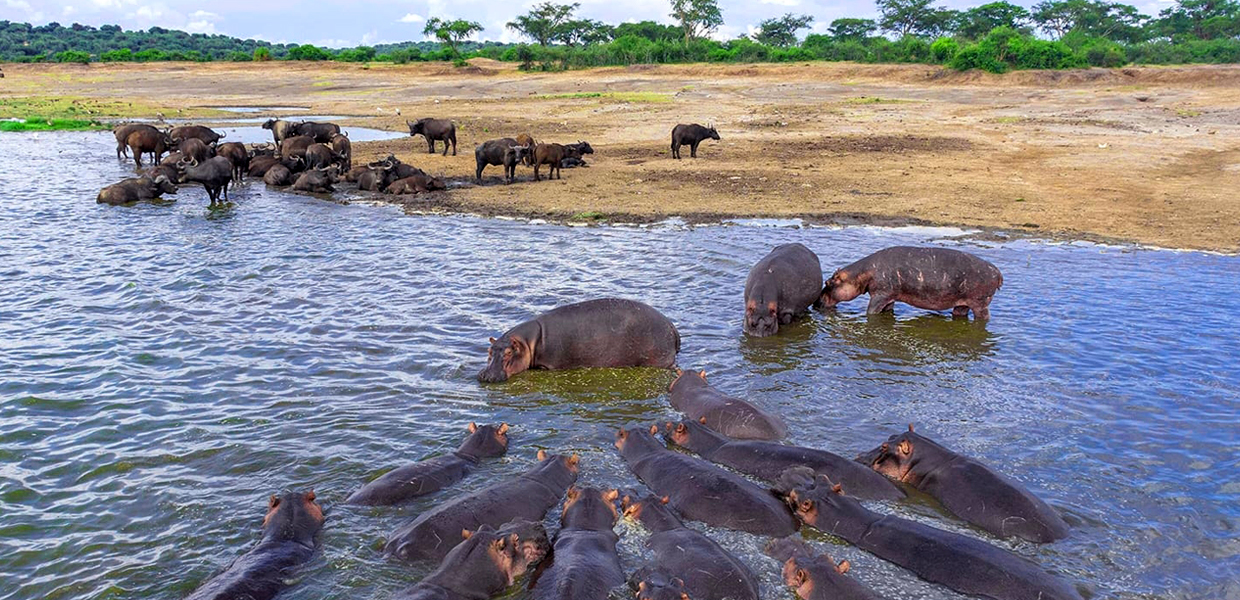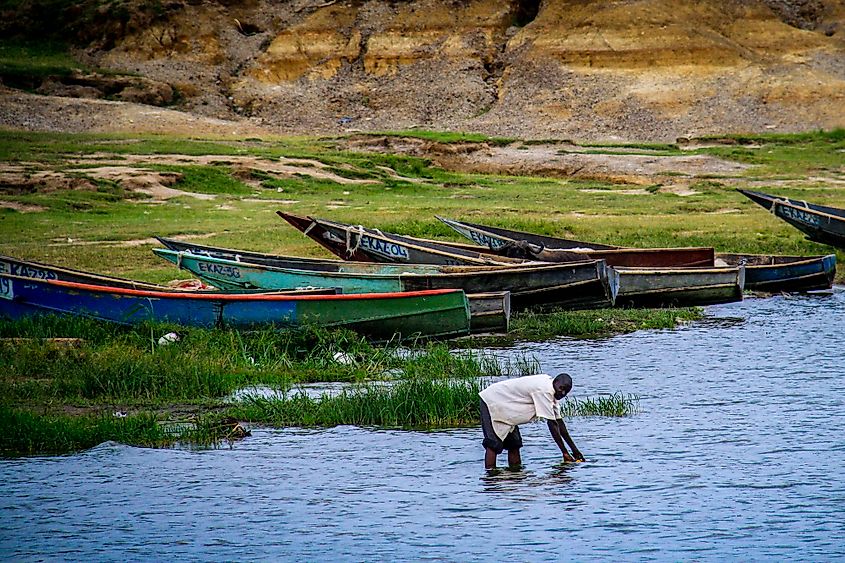The Family-Friendly Activities: Itinerary at Lakes George and Edward for Long-Stay Travelers
Where Adventure Meets Family Bonding
Family travel has long been associated with discovery, bonding, and the joy of seeing the world through the curious eyes of children. Yet not all destinations lend themselves easily to family-friendly exploration, especially when the goal is to combine comfort, adventure, and sustainability. In Uganda’s western region, two of Africa’s most magnificent lakes—Lake George and Lake Edward—emerge as ideal settings for families seeking not just brief holidays but extended stays enriched with culture, nature, and meaningful activities.
The lakes, nestled within the expanse of Queen Elizabeth National Park, form part of the UNESCO-recognized biosphere reserve and hold global importance for biodiversity. Their serene waters, dotted with islands and fringed by papyrus swamps, sustain a breathtaking variety of wildlife, bird species, and fishing communities. For long-stay travelers, particularly families, the lakes offer an immersive itinerary that is both leisurely and profound. Days here are not hurried; they unfold in rhythms that echo the gentle waves of the water and the timeless routines of the wildlife.
What follows is an exploration of how families can experience a family-friendly itinerary around Lakes George and Edward, designed for those seeking longer stays. Each activity deepens the understanding of this region’s natural beauty, cultural heritage, and ecological importance, while creating unforgettable memories across generations.
The Significance of Lakes George and Edward
A Natural Symphony of Two Lakes
Lake George and Lake Edward are hydrologically connected by the Kazinga Channel, a natural waterway that has become one of Uganda’s most celebrated attractions. Lake George, the smaller of the two, is framed by the dramatic Rwenzori Mountains and surrounded by papyrus swamps that serve as breeding grounds for birds and fish. Lake Edward, much larger and more expansive, stretches into the Democratic Republic of Congo, reflecting the immensity of the East African Rift Valley.
These lakes are more than mere landscapes—they are living ecosystems. Families who spend time here encounter the delicate balance between land and water, where hippos wallow, elephants graze along the banks, and fishing boats glide across calm waters. Every sunrise over the lakes illuminates not only scenic beauty but also a deeper truth: that nature, when preserved, nurtures communities and visitors alike.
Cultural and Ecological Importance
The lakes sustain countless communities who depend on fishing and agriculture, while also serving as sanctuaries for endangered species. Papyrus swamps, for example, act as filters that maintain water quality and as habitats for rare birds such as the shoebill stork. Families exploring these environments discover how ecological health is inseparably tied to community well-being.
For children, these encounters offer lessons in interconnectedness. The fish served on the dinner table is linked to the health of the lake, the reeds woven into a mat are linked to papyrus wetlands, and the calls of distant birds are signals of a thriving environment. Thus, the lakes become classrooms without walls, where learning takes place not through textbooks but through lived experience.
Crafting a Long-Stay Family Itinerary
The Gentle Start: Arrival and Settling In
Long-stay travel begins with rhythm rather than rush. Upon arrival, families often spend the first days simply settling into lakeside lodges or eco-friendly accommodations. The gentle pace allows children to adjust, while parents take in the tranquil scenery. Morning walks by the lakeshore introduce everyone to the setting: fishermen hauling in nets, birds gliding low over the water, and the slow but steady pulse of life around the lakes.
Evenings often unfold with storytelling by local guides, offering families an introduction to the myths and histories surrounding the lakes. These narratives, rooted in tradition, captivate children’s imaginations and offer parents an appreciation for the cultural depth of the region.
Exploring the Kazinga Channel
The Kazinga Channel is often described as the heartbeat of the area, and for families, a boat cruise along its length becomes a highlight. Over several days, families may undertake different excursions at varying times of day—morning, afternoon, or sunset—each revealing a different aspect of life along the banks.
Hippos, often seen basking in the shallows, provide children with both fascination and amusement, while elephants crossing the banks inspire awe. Families quickly realize that each sighting is not random but part of a broader ecological rhythm. Guides, skilled in interpreting animal behavior, offer insights that transform simple viewing into meaningful understanding.
Encounters with Wildlife on Land
Beyond the waters, extended stays allow families to embark on game drives within Queen Elizabeth National Park. Unlike short visits, long-stay travelers have the luxury of spacing out drives across different areas of the park, reducing fatigue and maximizing variety.
Children may delight in spotting lions resting under acacia trees, buffalo herds grazing, or warthogs scuttling through the grasslands. Parents, meanwhile, find satisfaction in watching children recognize animal patterns over time, learning patience and attentiveness. Each game drive becomes not just an excursion but a continuation of the family’s shared story.
Birding for Young Explorers
Birdwatching around Lakes George and Edward offers another dimension of exploration. The lakes and wetlands host more than 600 bird species, making the region a global haven for bird enthusiasts. For families, birding becomes a gentle, educational activity that children can easily engage with.
Equipped with binoculars, families spend mornings spotting kingfishers, pelicans, cormorants, and the elusive shoebill. Guides explain bird calls and behaviors, turning birding into an interactive experience that merges science with wonder. Over days and weeks, children begin to identify species by themselves, fostering a sense of achievement and deepening their bond with the natural world.
Cultural Immersion and Community Connections
No itinerary around Lakes George and Edward is complete without cultural immersion. Families staying for longer durations have the opportunity to visit fishing villages, meet local artisans, and participate in community activities. Children may watch fish being dried in the sun, learn simple crafts, or listen to songs passed down through generations.
These exchanges are not staged performances but genuine interactions that foster respect and appreciation. Parents often find that such cultural immersion offers children perspectives on simplicity, resilience, and shared humanity that are difficult to cultivate in more conventional settings.
Educational Activities for Children
Many lodges and conservation centers around the lakes provide tailored educational programs for young travelers. These may include guided nature walks, storytelling sessions about wildlife, or lessons on how local communities balance conservation with livelihood. Such experiences blend play with education, ensuring that children remain engaged while parents enjoy quieter moments.
For families, the value lies in the realization that every day brings learning opportunities, whether through structured activities or spontaneous observations. A butterfly landing on a child’s arm, a fisherman explaining the names of fish species, or a guide teaching the importance of tree cover—all become lasting memories etched with meaning.
Rest, Reflection, and Leisure
A long-stay itinerary is not defined by constant activity but by balance. Families find joy in slower days spent by the lakeside, watching sunsets paint the water in hues of orange and gold. Parents may read while children play on safe stretches of shore. Shared meals become opportunities to reflect on experiences, plan for upcoming adventures, or simply enjoy the present moment.
It is in these pauses that the full richness of long-stay travel is felt. The lakes cease to be destinations and become temporary homes, where families live not as hurried tourists but as participants in the natural and cultural life of the region.
The Deeper Value of Long-Stay Family Travel
Building Stronger Family Bonds
Time spent together in meaningful settings fosters bonds that transcend daily routines. Parents and children, removed from digital distractions and work obligations, find themselves sharing genuine conversations and collective wonder. A child’s first sight of a hippo, a parent’s laughter during a village dance, or the quiet of a sunset all become threads in a shared family narrative.
Over weeks, families notice how travel reshapes their relationships. Children gain independence as they explore nature, while parents learn to see the world anew through their children’s eyes. These bonds, nurtured in the stillness of lakes and the excitement of safaris, endure long after the journey ends.
Instilling Values of Conservation and Responsibility
Extended stays provide the time necessary for values to take root. Children begin to grasp not just the beauty of nature but the fragility of ecosystems. They see firsthand how human actions affect lakes, forests, and animals. Parents reinforce these lessons by modeling responsible travel practices, from respecting wildlife to supporting local initiatives.
In this way, the itinerary becomes more than entertainment—it becomes education. Families leave with not only memories but also a renewed sense of responsibility toward the planet, carried into their lives back home.
A Journey of Meaning and Memory
The journey around Lakes George and Edward offers families more than a holiday; it offers a chance to live within the heartbeat of nature, to embrace the rhythms of community life, and to create memories that bind generations. Through game drives, boat cruises, birdwatching, cultural immersion, and moments of reflection, families discover the profound gift of long-stay travel: the chance to experience depth over speed, connection over consumption, and purpose over mere leisure.
For families inspired to undertake such a journey, there is no better partner than WildHorn Africa. With expertise in crafting tailored African itineraries and a commitment to responsible travel, WildHorn Africa ensures that every family adventure is not only unforgettable but also meaningful. By booking with WildHorn Africa, families step into a world where every day is a blend of discovery, responsibility, and joy—a journey where Lakes George and Edward transform from destinations into living legacies.






